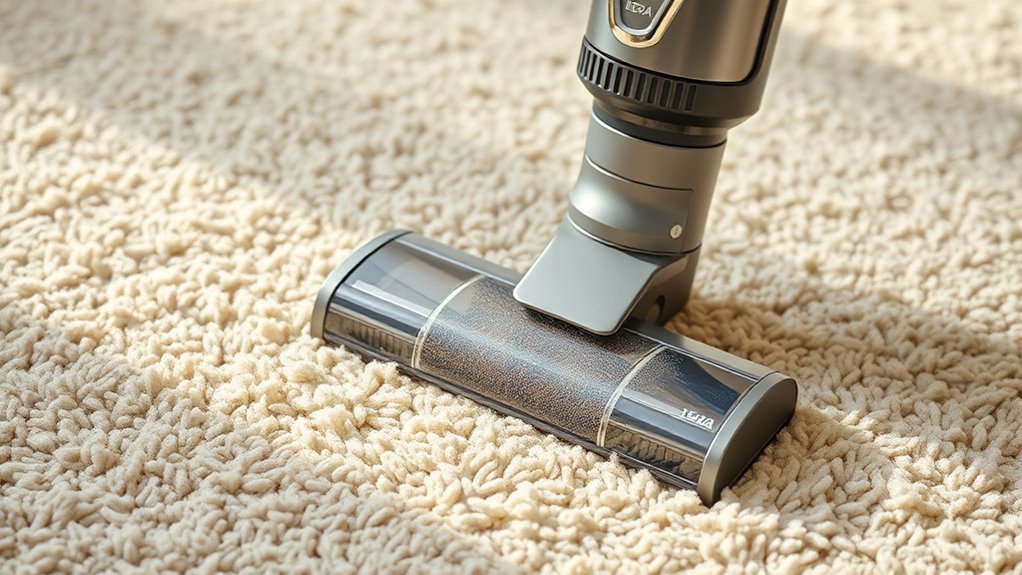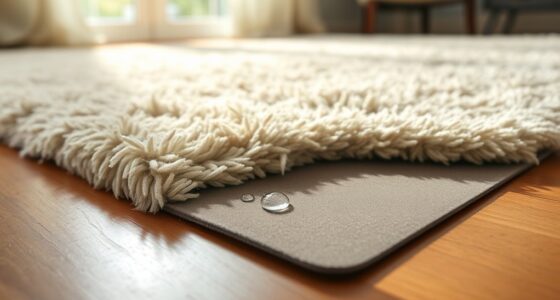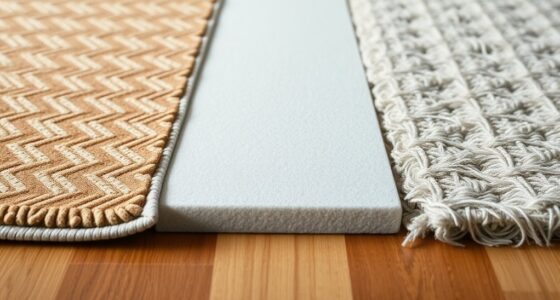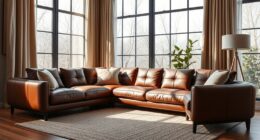To meet HEPA standards for luxury carpets, your vacuum should have certified filters that remove at least 99.97% of particles as small as 0.3 microns. Look for models with sealed systems to prevent dust leaks and durable construction for long-lasting performance. Proper maintenance, like regular filter changes, guarantees ongoing effectiveness. If you want to find out how to choose the best system, these key details will guide you toward ideal carpet care and air quality.
Key Takeaways
- Certified HEPA filters must capture at least 99.97% of particles as small as 0.3 microns for effective allergen removal.
- Sealed system design prevents unfiltered air from escaping, ensuring optimal filtration during carpet cleaning.
- Durable construction materials like reinforced plastics and corrosion-resistant metals extend vacuum lifespan and maintain filtration integrity.
- Regular maintenance and air quality testing verify that the vacuum consistently meets high filtration standards.
- Consumer and expert preferences emphasize lightweight, long-lasting filters for ease of use and sustained high-performance cleaning.
Understanding HEPA Filtration Efficiency Ratings
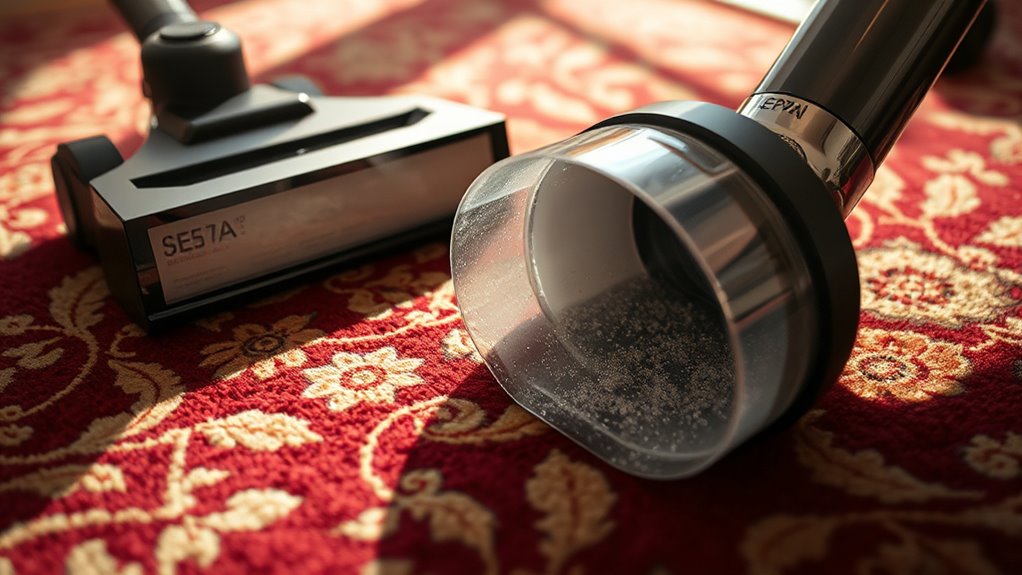
Understanding HEPA filtration efficiency ratings is essential because they determine how well a vacuum can remove tiny particles from the air. When evaluating a HEPA vacuum, look for clear indication of HEPA certification, which confirms it meets strict filtration standards. Filtration accuracy is key; a true HEPA filter captures at least 99.97% of particles as small as 0.3 microns. This precision ensures allergens, dust mites, and other microscopic contaminants don’t escape back into the environment. Don’t confuse general filters labeled as “HEPA-like” or “HEPA-type”—these often lack the official certification needed for reliable performance. Additionally, checking for certified HEPA filters guarantees the effectiveness of your cleaning efforts. By understanding these ratings, you can confidently select a vacuum that truly maintains air quality, especially important for those with allergies or asthma.
Certifications and Standards for HEPA Vacuums

Certifications and standards guarantee that HEPA vacuums meet strict performance criteria and reliably filter out microscopic particles. When shopping for a vacuum, look for recognized certifications like the HEPA Filter Certification or those from reputable organizations such as AHAM or UL. These standards ensure your vacuum adheres to rigorous testing, including performance in filtration and airflow. Proper maintenance protocols are essential to keep your vacuum functioning effectively over time, so choose models with clear, manageable maintenance routines. Additionally, an ergonomic design helps prevent user fatigue and improves ease of use, which supports consistent cleaning performance. Certifications and standards serve as a dependable guide, ensuring your vacuum delivers on its promise to preserve the cleanliness and health of your luxury carpets. For optimal results, selecting a vacuum with essential oil compatibility can also enhance the cleaning experience and maintain a fresh environment. Ensuring that your vacuum meets recognized performance standards can further guarantee long-term reliability and effectiveness. Incorporating quality assurance practices during manufacturing further reinforces the overall dependability of your HEPA vacuum.
Filtration System Design and Construction
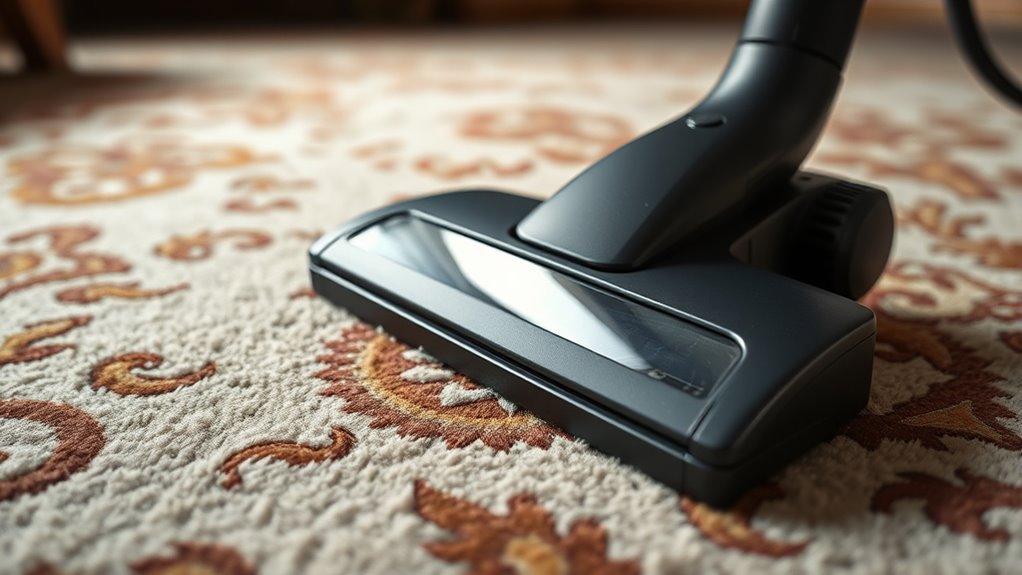
Your HEPA vacuum’s filtration system depends on high filter efficiency to trap tiny particles, ensuring clean air. You also need to confirm the system’s sealed integrity so no unfiltered air escapes. Using durable construction materials guarantees your vacuum performs reliably over time. Incorporating reliable testing methods can verify the effectiveness and durability of your filtration system. Regular performance assessments, such as air quality testing, help maintain optimal filtration standards and detect potential issues early. Ensuring proper filter maintenance is crucial for sustained performance and air purity. Given the importance of AI safety measures in safeguarding high-performance systems, implementing rigorous testing protocols can further enhance reliability and security.
HEPA Filter Efficiency
How well a HEPA filter performs depends largely on its efficiency in capturing particles, which is determined by its design and construction. A high-efficiency filter can trap tiny particles like dust mites and their allergens, preventing them from recirculating in your environment. Look for filters certified to remove at least 99.97% of particles as small as 0.3 microns. The filter’s construction, including the media and pleating, influences its ability to maintain consistent performance over time. Properly designed HEPA filters ensure that allergen removal is maximized, making your vacuum more effective for allergy sufferers. Additionally, selecting a filter with durable materials can help sustain its filtration capabilities even after prolonged use. Ensuring the filter maintains its integrity over time is essential for consistent performance. When selecting a filter, verify its efficiency ratings and certification to ensure it meets the standards necessary for luxury carpet care.
Sealed System Integrity
A sealed system is essential for guaranteeing that the air drawn into your HEPA vacuum remains clean and that no contaminants escape during operation. To achieve this, the filtration system must be tightly constructed and well-designed. Look for a vacuum with a durable seal around the vacuum motor and hose connections, preventing leaks. The hose should be flexible yet firm enough to maintain airtight integrity during use. Proper design minimizes dust escape, protecting your luxury carpets and indoor air quality. Consider the following features:
| Feature | Importance | Tips to Check |
|---|---|---|
| Sealed motor housing | Prevents dust leaks | Ensure no gaps around the motor |
| Hose connection seal | Maintains airtight suction | Test hose for leaks |
| Construction materials | Durable, reduces wear | Opt for high-quality plastics |
| Sealed compartment | Keeps contaminants contained | Inspect for tight seals |
| Hose flexibility | Ensures maneuverability without leaks | Flex with ease and remain sealed |
Additionally, airtight seals are crucial for maintaining the overall integrity of the vacuum’s filtration system. Ensuring that all components are properly sealed helps prevent dust and allergens from escaping, which is especially important for maintaining high-quality indoor environments. Proper seal integrity also contributes to the vacuum’s overall efficiency and longevity. Regular maintenance and checks can help sustain these sealing mechanisms over time, ensuring optimal performance.
Durable Construction Materials
Choosing filtration system components made from durable construction materials is essential for guaranteeing long-lasting performance and maintaining airtight integrity. When selecting parts, prioritize materials known for their durability, such as reinforced plastics and corrosion-resistant metals. Durable construction minimizes wear and tear, reducing the risk of leaks or component failure over time. Material durability directly influences the vacuum’s ability to sustain high efficiency, especially in demanding environments like luxury carpet cleaning. Investing in high-quality materials ensures your filtration system remains reliable, easy to maintain, and resistant to damage from frequent use. By focusing on durable construction, you protect your equipment’s longevity and uphold strict HEPA standards, delivering consistent, effective filtration for your luxury carpets. Additionally, selecting components made from corrosion-resistant metals can help prevent degradation caused by exposure to moisture or cleaning agents, further enhancing the system’s durability. Incorporating high-quality, durable materials throughout the design ensures the vacuum maintains optimal filtration performance over time. Recognizing the importance of end-of-life care in manufacturing can also guide the selection of sustainable, long-lasting components. Furthermore, utilizing materials with proven wear resistance can significantly extend the lifespan of critical parts in the filtration system.
Air Quality Testing and Certification Processes
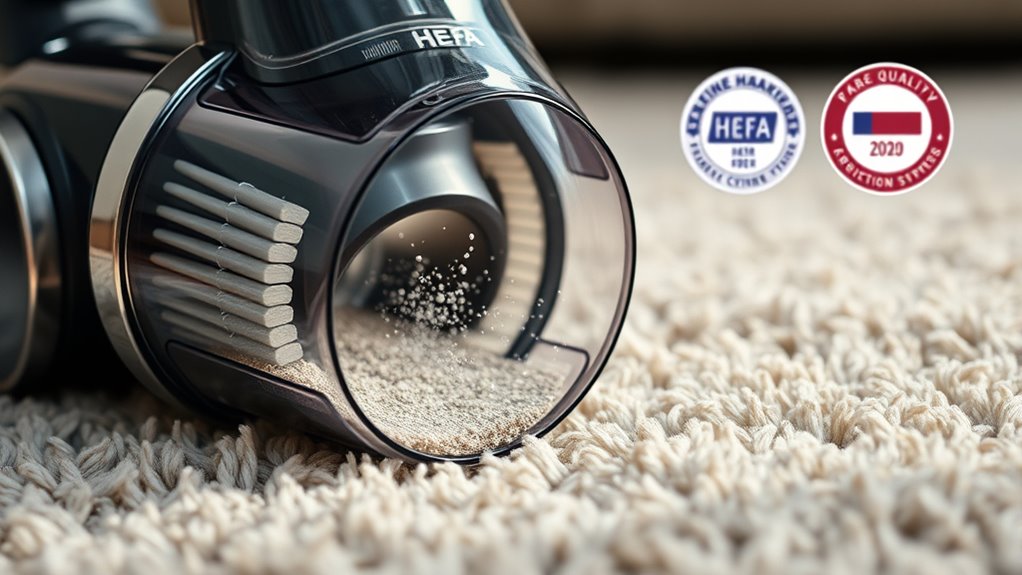
Have you ever wondered what it takes to guarantee a HEPA vacuum meets rigorous air quality standards? It all begins with thorough testing and certification processes. Experts analyze how well the vacuum traps airborne allergens, including dust mites and other tiny particles that can trigger allergies. You’ll find that certification involves multiple stages, such as laboratory tests that measure particulate capture efficiency and airflow performance. These tests confirm the vacuum can reduce airborne allergens to safe levels, ensuring cleaner indoor air. Certification bodies review the results, verifying that the vacuum consistently meets or exceeds established standards. When a vacuum is certified, you gain confidence that it effectively improves air quality by minimizing allergens and dust mites, making your space healthier and more comfortable. Biohacking techniques can further optimize your indoor environment for wellness. Additionally, adherence to industry standards ensures the vacuum’s performance remains reliable over time.
Particle Capture and Retention Capabilities
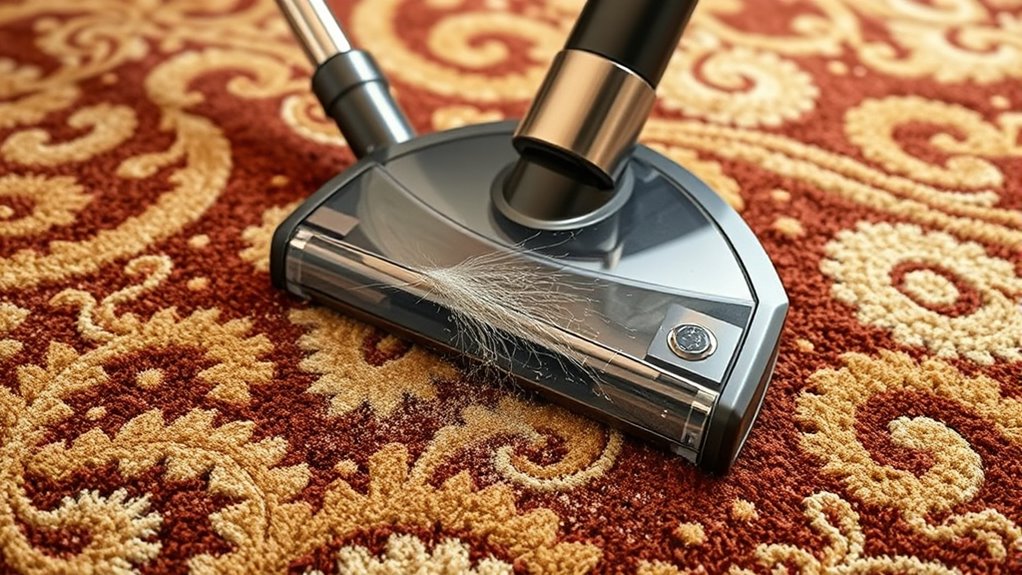
Understanding a HEPA vacuum’s particle capture and retention capabilities is essential for choosing the right equipment. You need to look at filtration efficiency standards and how well it retains particles of different sizes over time. This guarantees your vacuum can effectively trap contaminants and maintain clean air quality long-term.
Filtration Efficiency Standards
How well a HEPA vacuum filters out particles is essential to its effectiveness. High filtration efficiency guarantees that particles are captured and retained, reducing dirt distribution back into the air. Standards specify that a true HEPA vacuum must trap at least 99.97% of particles as small as 0.3 microns, ensuring deep-clean performance. This level of efficiency minimizes airborne allergens and contributes to healthier indoor environments. Additionally, filtration quality impacts noise levels; better filters often lead to quieter operation since less airflow resistance occurs. When choosing a vacuum for luxury carpets, look for models meeting strict filtration standards to maximize particle removal without sacrificing comfort. Proper filtration not only improves cleaning results but also enhances overall air quality and user experience.
Particle Size Retention
What size particles can a HEPA vacuum actually capture and hold? HEPA filters are designed to trap particles as small as 0.3 microns, which includes many allergens and dust mites. This size range is critical for effective allergen removal, especially in luxury carpets that can harbor hidden irritants. Dust mite debris and their waste are often tiny, but HEPA vacuums can retain these allergens, preventing them from recirculating into the air. The particle size retention capabilities guarantee that your vacuum doesn’t just move dirt around but genuinely captures microscopic particles that trigger allergies. By choosing a HEPA vacuum with proven particle retention, you enhance your carpet’s cleanliness and improve indoor air quality, making your space healthier and more comfortable.
Long-term Contaminant Capture
A HEPA vacuum’s ability to capture and retain contaminants over time depends on its filter’s design and construction. A high-quality filter ensures particles are trapped effectively, preventing their release back into the air. Over prolonged use, this retention helps preserve your carpet’s texture and color, reducing issues like fading caused by dirt and debris settling deep within fibers. Proper long-term capture also minimizes the buildup of allergens and dust mites, maintaining a healthier environment. To maximize these benefits, choose vacuums with filters that have proven particle retention capabilities.
| Filter Effectiveness | Impact on Carpet and Air Quality |
|---|---|
| High retention rate | Preserves texture, prevents color fading |
| Low retention rate | Allows contaminants to escape, damaging fibers |
Seal Integrity and Vacuum Enclosure Quality
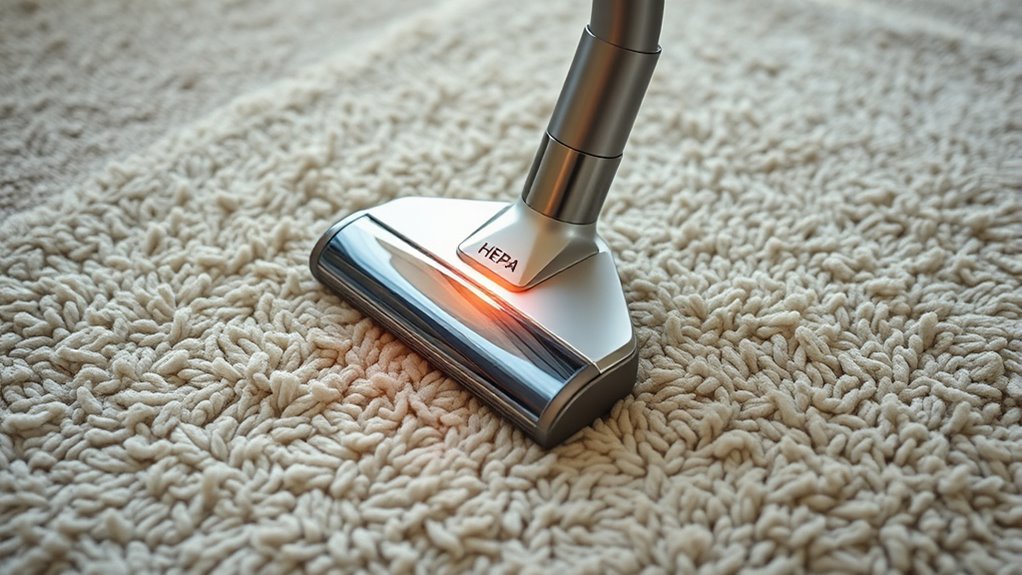
Ensuring the seal integrity and overall quality of the vacuum enclosure is critical for maintaining effective HEPA filtration standards. A tight seal prevents contaminated air from bypassing the filter, ensuring contaminants stay trapped. Poor seal integrity can lead to increased vacuum noise, making operation less comfortable and more disruptive. An ergonomic design contributes to ease of use, enabling you to handle the vacuum comfortably and maintain a proper seal during cleaning. High-quality enclosures also reduce air leaks and minimize vibrations that could compromise filtration performance. When selecting a vacuum, check for robust seals and durable materials that withstand daily use. Maintaining these standards guarantees your luxury carpet cleaning remains effective, quiet, and user-friendly, ensuring both thorough cleaning and a better overall experience.
Maintenance and Filter Replacement Guidelines
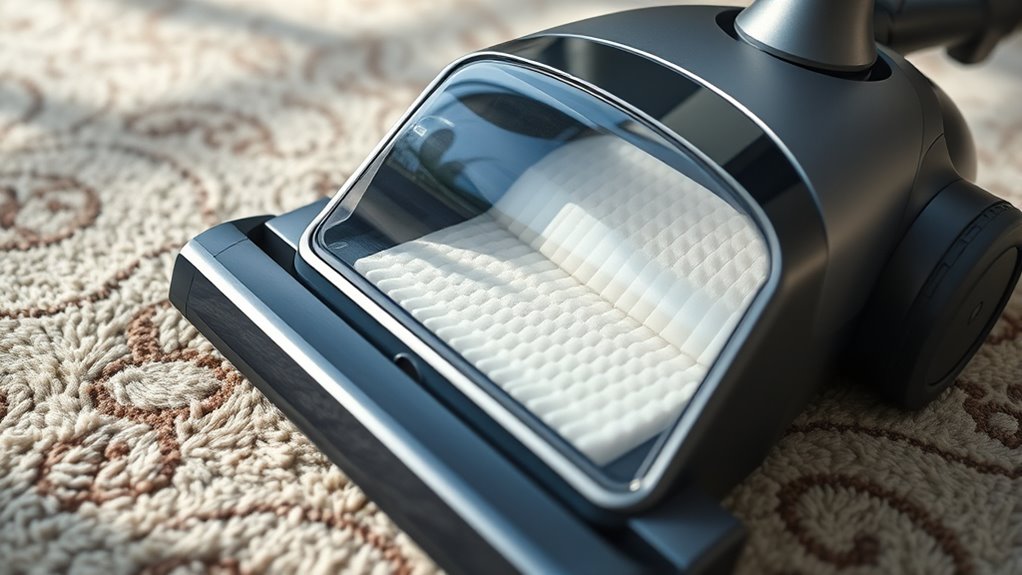
Regular maintenance and timely filter replacements are essential to keep your HEPA vacuum performing at its best. Replacing filters as recommended prevents mold buildup, which can cause unpleasant odors and compromise air quality. A clean filter also guarantees maximum airflow, leading to noise reduction during operation. Regularly check and clean the filters to maintain suction power and avoid strain on the motor. When filters become visibly dirty or after a specified usage period, replace them promptly. Proper maintenance minimizes the risk of mold growth inside the vacuum, protecting your health and prolonging the device’s lifespan. Consistent upkeep not only maintains peak performance but also ensures your luxury carpets stay clean and fresh, providing a healthier environment for your space.
Compatibility With Luxury Carpet Materials
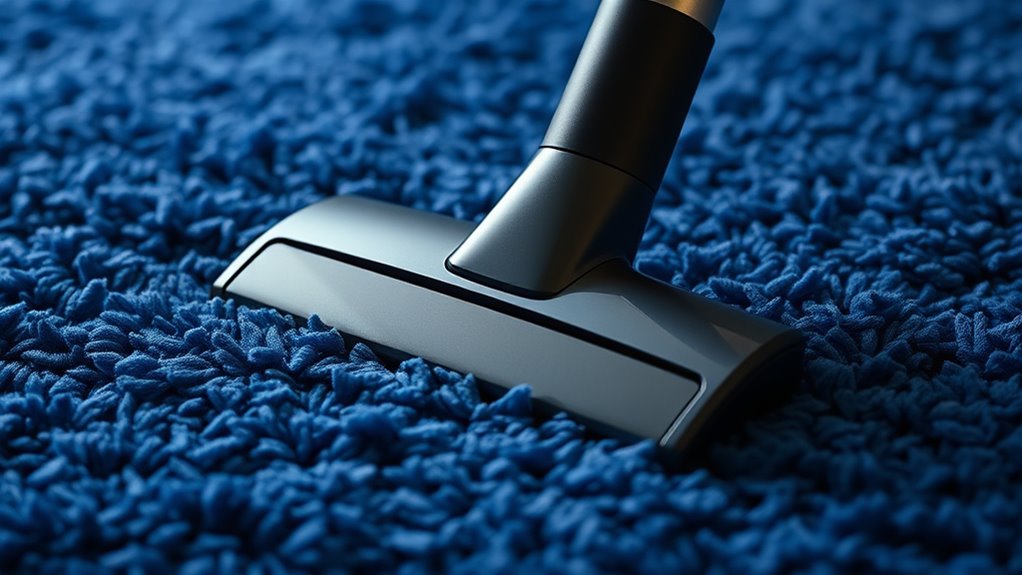
Are your HEPA vacuum’s settings and attachments suitable for your luxury carpets? Different luxury textiles and carpet fiber types require tailored cleaning approaches to avoid damage and ensure effective dirt removal. Using the wrong settings can harm delicate fibers or diminish carpet quality. Consider this compatibility guide:
| Carpet Fiber Type | Suitable HEPA Setting | Recommended Attachments |
|---|---|---|
| Wool | Low suction, gentle agitation | Upholstery or soft brush |
| Silk | Very low suction, minimal agitation | Delicate brush |
| Nylon | Medium suction, standard brush | Wide nozzle |
| Polyester | Medium to high suction | Soft bristle brush |
| Triexta | Medium suction, adjustable | Carpet rake |
Matching your vacuum to these specifications preserves your luxury textiles and keeps your carpets pristine.
Consumer Reviews and Industry Expert Recommendations
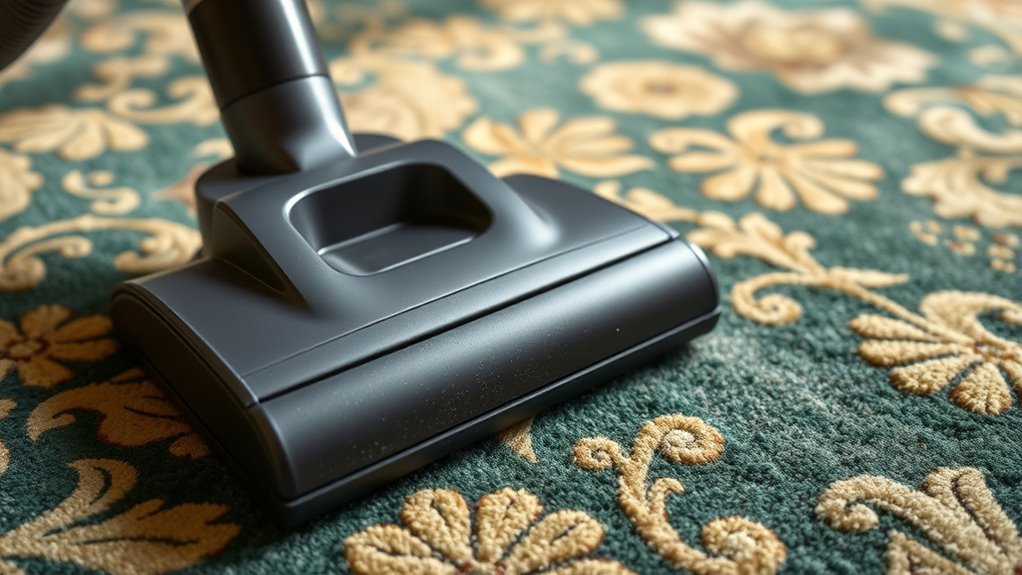
Have consumer reviews and industry expert recommendations influenced your choice of HEPA vacuum for luxury carpets? If so, you’ve likely noticed that many praise models with longer HEPA filter lifespan, ensuring consistent filtration and fewer replacements. Reviews often highlight the importance of manageable vacuum weight, making cleaning easier without sacrificing power. Experts emphasize that a lightweight vacuum reduces strain during extended cleaning sessions, especially on plush, luxurious carpets. Consumers also look for machines with durable filters, ensuring ideal performance over time. Industry recommendations suggest balancing filter lifespan with effective filtration and ease of use. By considering these insights, you can select a HEPA vacuum that offers both longevity and convenience, helping you maintain your luxury carpets’ beauty while minimizing hassle.
Frequently Asked Questions
How Often Should HEPA Filters Be Replaced in Luxury Carpet Vacuums?
You should check your HEPA filter’s lifespan regularly, as replacement frequency depends on usage and environment. Typically, filters need replacing every 6 to 12 months to maintain ideal performance. If you notice reduced suction or odors, it’s a sign to replace the filter sooner. By staying attentive to your vacuum’s filter lifespan, you guarantee it continues to effectively trap allergens and dust in your luxury carpets.
Do HEPA Vacuums Emit Any Odors or Particles During Operation?
You might imagine a HEPA vacuum quietly working, but it can emit slight odors or particles if not maintained properly. During operation, airflow noise may increase if filters are clogged, and you could notice a musty smell. Proper filter lifespan management ensures minimal emissions and keeps your environment fresh. Regularly replacing filters prevents odors, maintains ideal airflow, and keeps your vacuum functioning efficiently without releasing unwanted particles into the air.
Are HEPA Vacuums Suitable for Allergy-Sensitive Environments?
You’ll find that HEPA vacuums are highly suitable for allergy-sensitive environments because they improve air quality by trapping tiny particles that cause allergic reactions. When you use one, it effectively captures dust, pollen, and pet dander, reducing airborne allergens. This helps minimize allergic reactions and creates a healthier space. So, if you’re concerned about allergies, a HEPA vacuum is a smart choice to keep your environment cleaner and more comfortable.
How Do HEPA Standards Differ Between Domestic and Commercial Models?
Imagine a filter that’s a gatekeeper—its standards vary with purpose. Domestic HEPA models focus on user-friendly maintenance protocols and adequate filter efficiency for everyday needs. Commercial models, however, demand stricter standards, higher filter efficiency, and rigorous maintenance protocols to handle larger spaces and heavier use. So, the key difference lies in their design goals: convenience for home use versus performance and durability for commercial environments.
Can HEPA Vacuum Cleaners Be Customized for Specific Luxury Carpet Types?
You can customize HEPA vacuum cleaners for specific luxury carpet types by exploring various customization options like adjustable suction, brush height, and filtration features. These options improve carpet compatibility, ensuring thorough cleaning without damage. By tailoring your vacuum to match your carpets’ unique textures and fibers, you enhance cleaning efficiency and extend their lifespan, giving you a more effective, personalized cleaning experience.
Conclusion
By choosing a HEPA vacuum that meets top standards, you’re fundamentally arming your home with a mighty shield against dust and allergens. Think of it as a finely tuned orchestra, where each component plays in harmony to keep your luxury carpets pristine and your air pure. When you prioritize quality, your cleaning routine becomes a graceful dance—leaving behind a revitalizing breath of fresh, luxurious ambiance that truly elevates your living space.
